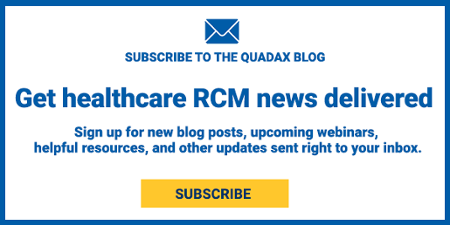Medical necessity rules policies are not a new phenomenon, but their impact on cash flow is increasingly sharp.
Medical necessity denials (initial) increased from 12% in 2015 to 20% in 2017 according to The Advisory Board 2015-2017 Hospital Revenue Cycle Benchmarking Surveys. The same report indicates that 27% of denial write-offs result from medical necessity denials.
The kicker is—most medical necessity denials are preventable.
It’s easy to play the blame game when it comes to medical necessity denials, since a breakdown can happen at any of several points:
- Is the ordering physician’s documentation complete and effective?
- Has the correct diagnosis code been selected?
- Has the registration or intake department checked medical necessity policy and obtained a signed Advance Beneficiary Notice (ABN) from the patient when needed?
- Has the encounter been coded appropriately?
- Has the claim been billed properly?
Medicare publishes thousands of rules, between National Coverage Determinations (NCDs) and Local Coverage Determinations (LCDs), plus Articles that in some cases define billing and coding guidelines for LCDs and in other cases stand alone. Commercial payers also use medical necessity policies, whether they have developed their own library or are relying on some set or subset of Medicare policy. Medicare policies change frequently and can sometimes be applied retroactively, but they are published in an organized manner, affording providers the opportunity to become familiar with those policies pertinent to their specialty. Commercial policies are sometimes harder to access in full, yet compliance is no less important.
Checking the applicable body of published policy before providing services is the first critical step to preventing medical necessity from becoming the mother of insolvency. Your patient access suite should be able to check Medicare medical necessity policy in real time. Registration representatives should routinely validate each patient’s procedure and diagnosis and be prepared to discuss an ABN with the patient when needed. Coaching or training of the registration staff, supplemented by talk tracks to keep on-hand, will help make this conversation beneficial to the patient and comfortable for the representative.
Using a billing system that checks medical necessity on the back end, during claim editing, is also valuable. Claims failing validation against published policy should be flagged for investigation. Is there a signed ABN on file? Are the codes appearing on the claim accurate according to the physician’s documentation? A claims processing system that facilitates electronic workflow between the billing office, patient access, and coding will make quick work of the collaboration required to ensure that claims submitted are correct and complete with accurate codes and modifiers as needed.
Be prepared to appeal when you’ve received a denial even after ensuring that medical necessity standards have been met. A September 2018 Office of Inspector General (OIG) report found, “When beneficiaries and providers appealed preauthorization and payment denials, Medicare Advantage Organizations (MAOs) overturned 75 percent of their own denials during 2014–16, overturning approximately 216,000 denials each year. During the same period, independent reviewers at higher levels of the appeals process overturned additional denials in favor of beneficiaries and providers.” Unfortunately, the same report found that during 2014-2016, only 1.1% of Medicare Advantage denials were appealed. Identify denials and take action.
Quadax can help. Our Denials, Appeals, and Audit Management solution recognizes full and line-item denials and presents them in an intuitive interface with easy access to source documents (the original claim, 835, and EOB), and appeal letter templates making it easy for your staff to classify and work denials. With our new Patient Access Management system, however, you will encounter fewer denials to manage because of its Medical Necessity module to identify coverage issues and generate ABNs when needed. Our top-rated Claims Management solution, Xpeditor™, boasts an extensive claim edits library including full Medicare medical necessity checking, plus validation per some commercial payers’ policy, as well. Best of all, our system modules talk to each other and to your EHR for complete, accurate workflow – and results.
Xpeditor checks all the boxes on the Five Must-Haves for your Claim Edits Library—does your system? And, if medical necessity, or any other group of denials, is a growing concern for your business office, let’s talk!


